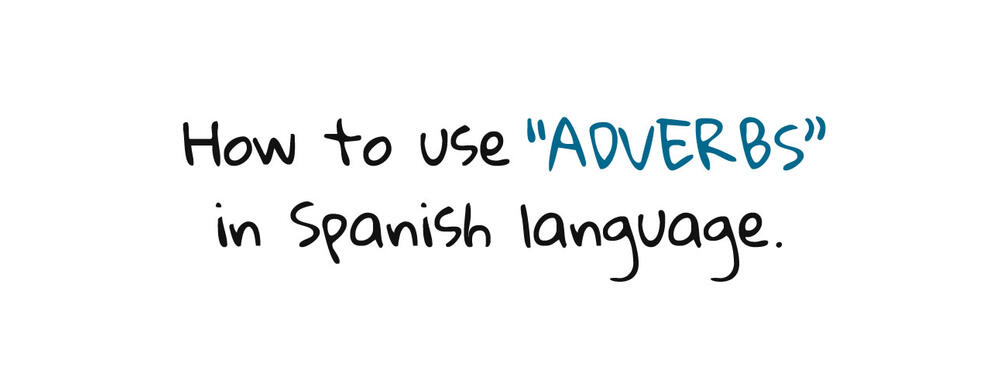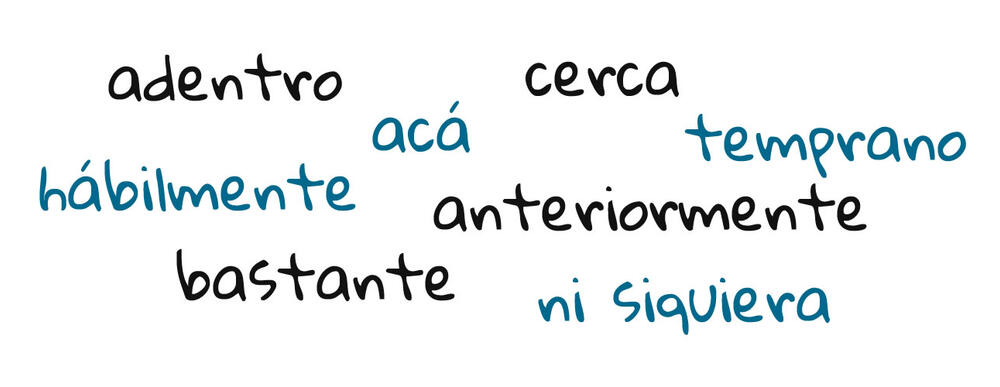Posted on Aug 22, 2021 |
The adverb in Spanish language is the invariable part of the sentence that can modify or complement the meaning of the verb, the adjective, another adverb or even a whole sentence.
Semantically, the adverb in Spanish Language expresses circumstances of place, time, mode, quantity, order, doubt, among others, and its main function in the sentence context is to serve as a circumstantial complement, this means that it can answer the questions where, how, when or how many. The adverb in Spanish language is also characterized by being morphologically invariable in gender and number. For example "Esa camisa es muy fea y esa blusa es muy bonita" (That shirt is very ugly and that blouse is very pretty).
The word adverb in Spanish (adverbio) derives from the Latin word “adverbium”, which is formed by the prefix ad- (which means : towards or together), verbum (which means : word or verb), and the Latin suffix -ium.
Adverb Types
Place (lugar)
Express circumstances of place and space
abajo, adelante, adentro, adonde, acá, ahí, allá, allí, alrededor, aquí, arriba, atrás, cerca, debajo, delante, detrás, dentro, donde (down, forward, inside, where, here, there, there, there, around, here, up, behind, near, under, in front, behind, inside, where)
Time (tiempo)
Express circumstances of time
hoy, ayer, mañana, tarde, temprano, pronto, ya, nunca, ahora, enseguida, todavía, aún, recién, entonces, mientras, antes, después, anoche, luego, siempre, jamás, ocasionalmente, anteriormente (today, yesterday, tomorrow, later, early, soon, already, never, now, right away, still, still, just, then, while, before, after, last night, then, always, never, occasionally, previously)
Way / Mode (modo)
These indicate modal qualities or qualify those of the adjective
adrede, así, aún, aprisa, bien, claro, como, despacio, ligero, mal, mejor, rápido, regular, similar, tal, peor, apasionadamente (purposely, well, yet, quick, good, clear, like, slow, light, bad, better, fast, regular, similar, so, worse, passionately)
Quantity (cantidad)
Express quantitative modifications
apenas, mucho, poco, algo, nada, muy, harto, demasiado, medio, mitad, bastante, más, menos, casi, sólo, cuánto, qué, tan, tanto (hardly, a lot, a little, something, nothing, very, fed up, too much, half, half, a lot, more, less, almost, only, how much, what, so, so much)
Affirmation (afrimación)
These are used to affirm or sustain an idea
sí, cierto, ciertamente, claro, bueno, claramente, seguramente, efectivamente, acertadamente, evidentemente, naturalmente (yes, true, certainly, clear, well, clearly, surely, indeed, rightly, obviously, naturally)
Denial (negación)
These are used to deny something
no, nunca, jamás, tampoco, nada, ni siquiera, ninguno, ninguna, para nada (no, never, never, neither, nothing, not even, none, none, not at all)
Examples of adverbs in sentences
Place
- María viaja lejos a diario. (Maria travels far and wide every day.)
- La cesta con naranjas está aquí. (The basket with oranges is here.)
- La maleta está arriba del carro (The suitcase is on top of the car.)
Time
- Todavía no he llegado a mi oficina. (I have not yet reached my office.)
- Siempre me saluda cada mañana. (He always greets me every morning.)
- Luisa llegó tarde a la audición de piano. (Luisa was late for the piano audition.)
Mode
- Ese vestido es similar al mio. (That dress is similar to mine.)
- Esta fue mi peor caída en la patineta. (This was my worst fall on the skateboard.)
- Siempre te ríes así cuando algo no me sale bien. (You always laugh like that when something doesn't work out for me.)
Quantity
- Me gusta bastante la sopa de verduras. (I quite like the vegetable soup.)
- Hicimos mucho ejercicio hoy. (We did a lot of exercise today.)
- Yo como poco para la cena. (I eat little for dinner.)
Affirmation
- Ella sí quiere estudiar artes gráficas. (She does want to study graphic arts.)
- Seguramente lograrás tus objetivos. (You will surely achieve your goals.)
- Por supuesto, mañana nos vemos por la tarde. (Of course, we'll see you tomorrow afternoon.)
Denial
- No me gusta tomar gaseosas. (I don't like to drink soda.)
- Jamás había visto un lugar como este. (I've never seen a place like this.)
- Ellos tampoco han visitado este país. (They have not visited this country either.)
Doubt
- Luis posiblemente no venga hoy. (Luis may not be coming today.)
- Quizá ellos quieran salir a correr con nosotros. (Maybe they want to go running with us.)
- Nosotros probablemente viajemos este verano. (We will probably travel this summer.)
We will continue with the second part of this important subject...
Latest Posts
-
Easter Week 2025 Schedule Processions Antigua Guatemala
- Mar 02, 2025 -
Ten Beautiful Words in the Spanish Language
- Jul 13, 2024 -
Easter Week 2024 in Antigua Guatemala
- Feb 04, 2024

